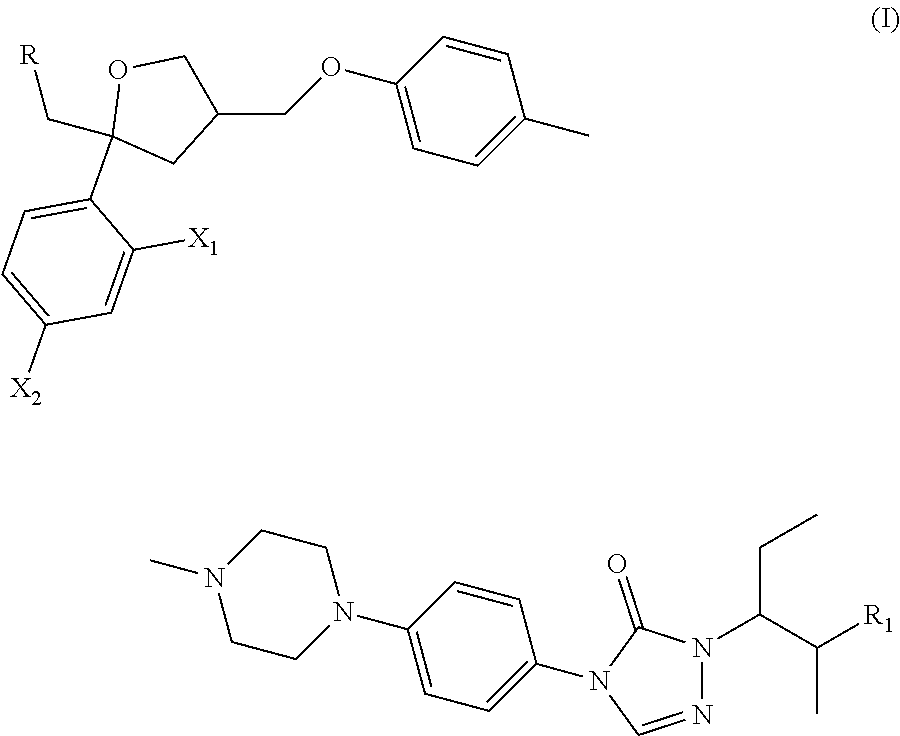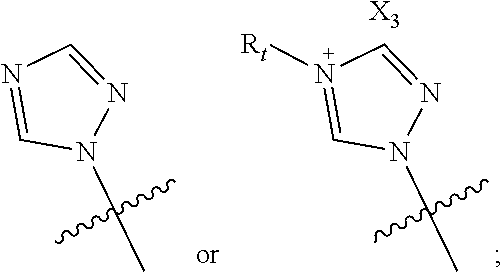Posaconazole derivative, pharmaceutical composition and use thereof
a technology of posaconazole and derivatives, applied in the field of antibiotic drugs, can solve the problems of large differences in pharmacokinetic parameters among individuals, serious side effects of clinically applied antifungal drugs, and drug resistance, and achieve the effects of reducing the number of patients, and reducing the number of clinical trials
- Summary
- Abstract
- Description
- Claims
- Application Information
AI Technical Summary
Benefits of technology
Problems solved by technology
Method used
Image
Examples
preparation example
Example 1
Preparation of Compound ST0001 of the Present Disclosure
[0199]1.1 Preparation of Compound (ST0001-001)
[0200]10.3 g of dimethyl D-tartrate was weighed into a 250 ml three-necked flask, 100 ml of toluene, 17.7 g of benzaldehyde dimethyl acetal, and 600 mg of p-toluenesulfonic acid monohydrate were successively added, the temperature was raised to 80° C. to 90° C., and the reaction was incubated overnight. Under TLC monitoring, the raw materials were substantially reacted. The reaction solution was quenched with 40 ml of 2 wt % NaHCO3 solution, extracted with MTBE, washed with H2O and saturated brine respectively, dried over anhydrous MgSO4, filtered, concentrated under reduced pressure, and separated by column chromatography to give 4.8 g of white solid (ST0001-001).
[0201]1.2 Preparation of Compound (ST0001-002)
[0202]4.8 g of ST0001-001 was dissolved in 90 ml of methanol, cooled to 0° C. to 5° C., 405 mg of NaBH4 was added, and the reaction was incubated for 2 hours. Under TL...
example 2
Preparation of Compound ST0002 of the Present Disclosure
[0214]2.1 Preparation of Compound (ST0002-002)
[0215]Under nitrogen atmosphere, 2.0 g of 2-methylamino-3-pyridinemethanol, 80 mL of dichloromethane, and N,N-diisopropylethylamine (1.87 g) were added to a 250 mL three-necked flask, stirred and cooled to −15 to −20° C., and a solution of 2.0 g of 1-chloroethyl chloroformate in dichloromethane (20 mL) was added dropwise and the addition was completed over 1 hr. The reaction temperature was kept at −15 to −20° C. to allow reacting for 16 hours to obtain a reaction solution. 2.8 g of BOC-glycine (CAS No.: 4530-20-5, wherein BOC represents tert-butyloxycarbonyl), 0.53 g of DMAP were added to the reaction solution, stirred, and 2.47 g of 1-ethyl-3-(3-dimethylaminopropyl)carbodiimide was added in batches over 10 minutes, and the reaction was kept at the temperature of −15 to −20° C. for 8 hours. It was determined by TLC that the reaction was complete, the reaction solution was concentra...
example 3
Preparation of Compound ST0003 of the Present Disclosure
[0226]3.1 Preparation of Compound (ST0003-002)
[0227]The preparation method referred to the example of the compound (ST0002-002).
[0228]3.2 Preparation of Compound (ST0003-003)
[0229]The preparation method referred to the example of the compound (ST0002-003).
[0230]3.3 Preparation of Compound (ST0003)
[0231]2.0 g of ST0003-003 compound was dissolved in 10 mL of methylene chloride at room temperature, and dissolved with stirring. A solution of hydrogen chloride in 1,4-dioxane was added dropwise over 10 minutes, and the mixture was stirred at room temperature for 1 hr. It was determined by TLC that the reaction was completed. The solution was decanted and concentrated to dryness and treated with acetone and methyl tert-butyl ether to give 1.41 g of solid product (ST0003), MS (ESI, ½*(M−Cl)): 512.5.
[0232]Referring to the preparation method of the compound (0002), onium salts with different anions or free products can be obtained.
[0233]...
PUM
| Property | Measurement | Unit |
|---|---|---|
| temperature | aaaaa | aaaaa |
| temperature | aaaaa | aaaaa |
| pH | aaaaa | aaaaa |
Abstract
Description
Claims
Application Information
 Login to View More
Login to View More - R&D
- Intellectual Property
- Life Sciences
- Materials
- Tech Scout
- Unparalleled Data Quality
- Higher Quality Content
- 60% Fewer Hallucinations
Browse by: Latest US Patents, China's latest patents, Technical Efficacy Thesaurus, Application Domain, Technology Topic, Popular Technical Reports.
© 2025 PatSnap. All rights reserved.Legal|Privacy policy|Modern Slavery Act Transparency Statement|Sitemap|About US| Contact US: help@patsnap.com



